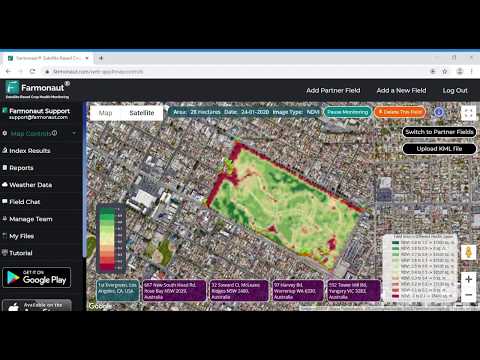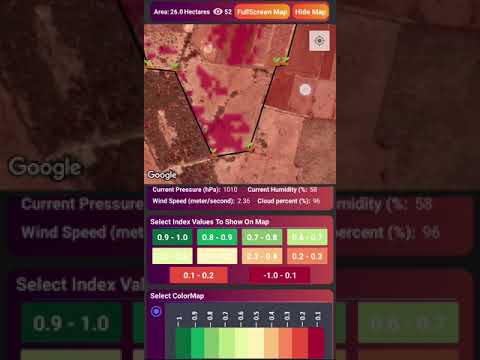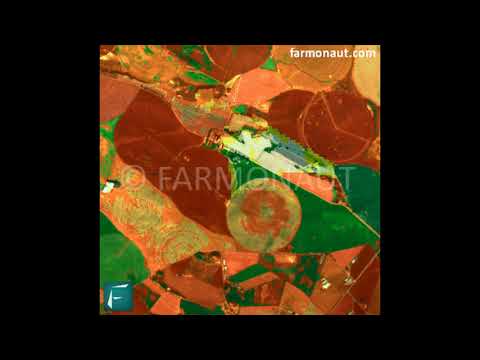Mastering Potassium Deficiency: Smart Farming Solutions for Optimal Crop Yield and Plant Health
In the ever-evolving world of agriculture, we are constantly seeking innovative ways to enhance crop productivity and plant health. One crucial aspect of this pursuit is mastering the management of essential macronutrients, with potassium playing a pivotal role. In this comprehensive guide, we’ll explore the importance of potassium in plant growth, the challenges of potassium deficiency, and the cutting-edge solutions offered by smart farming technologies.

“Potassium deficiency can reduce crop yields by up to 30% in severely affected plants.”
Understanding Potassium’s Role in Plant Health
Potassium is one of the three primary macronutrients essential for plant growth and development. Its importance cannot be overstated, as it plays a crucial role in various physiological processes:
- Osmotic regulation: Potassium helps maintain cell turgor and regulates water uptake.
- Photosynthesis: It aids in the efficient conversion of light energy into chemical energy.
- Stomata function: Potassium regulates the opening and closing of stomata, controlling gas exchange and water loss.
- Enzyme activation: It activates numerous enzymes involved in plant metabolism.
- Nutrient transport: Potassium facilitates the movement of other nutrients throughout the plant.
Recognizing Potassium Deficiency Symptoms
Identifying potassium deficiency early is crucial for maintaining optimal crop health. Common symptoms include:
- Chlorosis: Yellowing of leaf margins and tips, often progressing inward
- Necrosis: Brown, dry patches on leaf edges
- Stunted growth: Reduced plant size and vigor
- Weak stems: Increased susceptibility to lodging
- Poor fruit development: Reduced size, quality, and delayed ripening of fruits
Causes of Potassium Deficiency in Soils
Several factors can contribute to potassium deficiency in agricultural soils:
- Sandy soils: These soils have poor retention of nutrients, including potassium
- Intensive cropping: Repeated harvests can deplete soil potassium reserves
- Leaching: Excessive rainfall or irrigation can wash away potassium
- Soil pH imbalance: Extreme pH levels can affect potassium availability
- Competing cations: High levels of calcium or magnesium can interfere with potassium uptake
Smart Farming Solutions for Potassium Management
In the era of precision agriculture, we have access to advanced tools and technologies that can revolutionize potassium management. Let’s explore some of these innovative solutions:
1. Satellite-Based Crop Health Monitoring
Platforms like Farmonaut utilize satellite imagery to provide real-time insights into crop health, including potential nutrient deficiencies. This technology allows farmers to:
- Detect early signs of potassium deficiency across large areas
- Create precise application maps for targeted fertilizer use
- Monitor the effectiveness of fertilizer applications over time
2. AI-Powered Advisory Systems
Artificial intelligence is transforming the way we approach nutrient management. AI-driven systems can:
- Analyze soil test results, crop history, and environmental data
- Provide personalized recommendations for potassium fertilization
- Predict potential deficiencies before visible symptoms appear
3. Precision Application Technologies
Advanced machinery equipped with GPS and variable-rate technology enables:
- Site-specific application of potassium fertilizers
- Reduced waste and improved nutrient use efficiency
- Integration with satellite and soil sensor data for optimal application
Sustainable Approaches to Potassium Fertilization
While addressing potassium deficiency is crucial, it’s equally important to do so sustainably. Here are some environmentally friendly approaches:
1. Organic Fertilizers
Utilizing organic sources of potassium can improve soil health and provide a slow-release nutrient supply. Options include:
- Compost and well-rotted manure
- Wood ash (in moderation)
- Seaweed extracts
2. Crop Rotation and Cover Crops
Implementing smart crop rotation strategies and using cover crops can help:
- Improve nutrient cycling in the soil
- Reduce the risk of potassium depletion
- Enhance overall soil health and structure
3. Integrated Nutrient Management
Combining organic and inorganic sources of potassium can optimize nutrient availability while promoting soil health. This approach involves:
- Balancing the use of chemical fertilizers with organic amendments
- Considering the interactions between different nutrients
- Adapting fertilization strategies based on crop needs and soil conditions

“Precision agriculture techniques can increase potassium use efficiency by 15-20% compared to traditional methods.”
Innovative Application Methods for Potassium Fertilizers
To maximize the efficiency of potassium fertilization, consider these advanced application techniques:
1. Foliar Sprays
Foliar application of potassium can provide quick relief for deficient plants. Benefits include:
- Rapid absorption through leaf surfaces
- Bypass of soil-related uptake issues
- Precise targeting of specific growth stages
2. Fertigation
Integrating potassium fertilizers into irrigation systems offers several advantages:
- Improved nutrient distribution throughout the root zone
- Reduced labor costs and soil compaction
- Enhanced water use efficiency
3. Slow-Release Formulations
Using slow-release potassium fertilizers can provide a steady nutrient supply:
- Prolonged availability of potassium throughout the growing season
- Reduced risk of nutrient leaching
- Improved synchronization with plant uptake patterns
Integrating Potassium Management with Pest and Disease Control
Proper potassium nutrition plays a crucial role in plant defense mechanisms. Consider these aspects when developing an integrated management strategy:
- Enhanced resistance: Well-nourished plants are better equipped to resist pest and disease pressure
- Balanced approach: Combine optimal potassium management with other IPM techniques
- Monitoring: Use advanced technologies to track both nutrient status and pest populations
Adapting Potassium Management to Climate Change
As we face increasing climate variability, it’s essential to adapt our potassium management strategies:
- Drought resistance: Adequate potassium improves water use efficiency and drought tolerance
- Temperature extremes: Potassium helps plants cope with both heat and cold stress
- Flexible planning: Use climate-smart agriculture techniques to adjust fertilization based on changing conditions
The Role of Technology in Optimizing Potassium Use
Embracing cutting-edge technologies can significantly enhance our approach to potassium management:
1. Remote Sensing
Satellite and drone-based imaging technologies offer valuable insights:
- Early detection of potassium deficiency symptoms across large areas
- Creation of precise nutrient maps for targeted applications
- Monitoring of crop response to potassium treatments over time
2. IoT Sensors and Data Analytics
Integrating Internet of Things (IoT) devices with data analytics platforms enables:
- Real-time monitoring of soil potassium levels
- Automated alerts for potential deficiencies
- Data-driven decision-making for fertilizer applications
Economic Considerations in Potassium Management
While optimizing potassium nutrition is crucial for crop health, it’s important to consider the economic aspects:
- Cost-benefit analysis: Evaluate the return on investment for different potassium management strategies
- Precision application: Use smart farming technologies to minimize waste and maximize efficiency
- Long-term soil health: Consider the economic benefits of maintaining optimal potassium levels for sustained productivity
Potassium Deficiency Detection and Management with Farmonaut Satellite System
| Aspect | Traditional Methods | Farmonaut Satellite System | Improvement (%) |
|---|---|---|---|
| Early Detection Time | 21 days | 7 days | 66.7% |
| Field Coverage | 20% | 100% | 400% |
| Precision in Identifying Affected Areas | 60% | 95% | 58.3% |
| Cost-Effectiveness | Baseline | 40% savings | 40% |
| Integration with Precision Agriculture | Limited | Seamless | N/A |
Future Perspectives in Potassium Management
As we look to the future of agriculture, several exciting developments are on the horizon for potassium management:
- Nanotechnology: Development of nano-formulated potassium fertilizers for enhanced efficiency
- Genetic engineering: Creation of crops with improved potassium use efficiency
- AI and machine learning: Advanced predictive models for optimizing potassium application timing and rates
- Blockchain technology: Improved traceability and transparency in potassium fertilizer supply chains
Conclusion: Embracing Smart Farming for Optimal Potassium Management
Mastering potassium deficiency is a critical component of modern, sustainable agriculture. By leveraging smart farming solutions, integrating advanced technologies, and adopting holistic management practices, we can optimize crop yields, enhance plant health, and promote long-term soil fertility. As we continue to face global challenges such as climate change and food security, innovative approaches to nutrient management will play an increasingly vital role in shaping the future of agriculture.
Remember, the key to success lies in combining cutting-edge technology with sound agronomic principles. By staying informed about the latest advancements and adapting our practices accordingly, we can ensure that our crops receive the optimal potassium nutrition they need to thrive in an ever-changing world.
Frequently Asked Questions (FAQ)
- What are the main functions of potassium in plants?
Potassium plays crucial roles in osmotic regulation, photosynthesis, stomata function, enzyme activation, and nutrient transport within plants. - How can I identify potassium deficiency in my crops?
Look for symptoms such as chlorosis (yellowing) of leaf margins and tips, necrosis (brown, dry patches) on leaf edges, stunted growth, weak stems, and poor fruit development. - What causes potassium deficiency in soils?
Common causes include sandy soils, intensive cropping, leaching due to excessive rainfall or irrigation, soil pH imbalances, and competition from other cations like calcium or magnesium. - How can smart farming technologies help in managing potassium deficiency?
Technologies like satellite-based crop health monitoring, AI-powered advisory systems, and precision application technologies can help detect deficiencies early, provide targeted recommendations, and optimize fertilizer application. - Are there organic sources of potassium for crop fertilization?
Yes, organic sources include compost, well-rotted manure, wood ash (in moderation), and seaweed extracts.
For more information on how Farmonaut can help you optimize your crop’s potassium management and overall health, visit our website or try our satellite-based crop health monitoring system today!
For developers interested in integrating our satellite and weather data into their own systems, check out our API and API Developer Docs.






